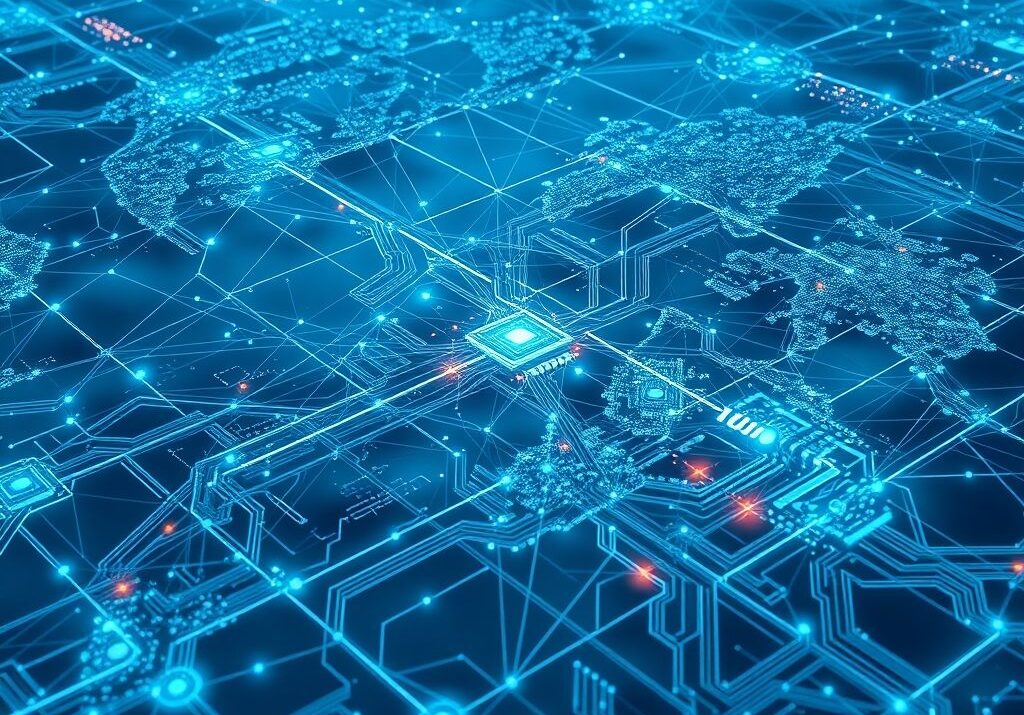Just caught an interesting piece on Cointelegraph about Marc Andreessen’s take on the current AI landscape, and it’s got me thinking. He argues that the AI race between the US and China is shaping up to be a new kind of Cold War. Now, that’s a pretty strong statement, but the more I chew on it, the more it resonates.
Andreessen highlights the concentration of AI development. He basically says the vast majority of meaningful AI platforms are being built in either China or the United States. That’s a stark reality. It immediately brings to mind the space race or the nuclear arms race – a concentrated effort by two superpowers to dominate a critical technology.
But is it really like the Cold War? Well, consider this: AI is poised to reshape economies, militaries, and potentially even societies. Whoever leads in AI will likely have a significant advantage in the 21st century. And it’s not just about who has the best algorithms. It’s about who has the data, the talent, and the infrastructure to truly harness AI’s potential.
China has made no secret of its ambition to become the global leader in AI by 2030. Their government has invested heavily in AI research and development. According to a report by the Center for Security and Emerging Technology (CSET) at Georgetown University, China is rapidly closing the gap with the US in AI capabilities, particularly in areas like computer vision and natural language processing. [Link to CSET report]
The US, on the other hand, still holds a strong position in AI research and innovation. Silicon Valley, with its concentration of tech giants and venture capital, remains a hotbed for AI development. However, concerns are growing about the need for more strategic investment and a more coordinated national AI strategy. As a 2021 report by the National Security Commission on Artificial Intelligence (NSCAI) concluded, the U.S. needs to accelerate its AI adoption to maintain its competitive edge. [Link to NSCAI report]
So, what’s at stake here? Beyond economic and military dominance, the AI race also raises important ethical and societal questions. How will AI be used? Who will control it? And how can we ensure that AI benefits all of humanity, not just a select few? These are crucial questions that need to be addressed as this AI rivalry intensifies.
Key Takeaways:
- Concentrated Power: AI development is heavily concentrated in the US and China, creating a potential power imbalance.
- National Strategies are Crucial: Both countries require clear and comprehensive strategies to secure their position in the AI landscape.
- Closing the Gap: China is rapidly catching up to the US in AI capabilities, particularly in specific fields.
- Ethical Considerations are Paramount: The AI race raises fundamental questions about AI’s use, control, and societal impact.
- Beyond Technology: The race involves data, talent, and infrastructure as much as algorithmic advancement.
This isn’t just a tech story; it’s a geopolitical one. It’s a story about the future of power, influence, and perhaps even the very nature of human society. It’s a conversation we all need to be a part of.
FAQ: The AI Race & Global Implications
- What exactly is the “AI race”? It refers to the intense competition between nations, primarily the US and China, to become leaders in artificial intelligence research, development, and deployment.
- Why is AI considered so important? AI is seen as a transformative technology with the potential to revolutionize industries, economies, national security, and various aspects of daily life.
- What are the main strengths of the US in the AI race? The US boasts a strong innovation ecosystem, leading AI research institutions, a vibrant venture capital scene, and a concentration of tech giants in Silicon Valley.
- What are the main strengths of China in the AI race? China has a vast amount of data, strong government support for AI development, a growing pool of AI talent, and a rapidly expanding technology sector.
- What are some potential risks associated with the AI race? Risks include an arms race dynamic, the misuse of AI for surveillance or autonomous weapons, ethical concerns about bias and discrimination, and job displacement due to automation.
- How does data play a role in AI development? AI algorithms require massive amounts of data to learn and improve. Countries with access to large datasets have a significant advantage in developing more effective AI systems.
- What are the ethical considerations surrounding AI development? Ethical concerns include bias in algorithms, privacy violations, the potential for job displacement, and the impact of AI on human autonomy and decision-making.
- How can countries ensure responsible AI development? Responsible AI development requires collaboration between governments, industry, and academia to establish ethical guidelines, promote transparency, and mitigate potential risks.
- What is the role of government in promoting AI innovation? Governments can play a crucial role by investing in AI research, supporting education and training programs, fostering collaboration between industry and academia, and developing policies that encourage responsible AI development.
- How will the AI race affect everyday life? The AI race is likely to impact everyday life in numerous ways, from personalized healthcare and more efficient transportation to new forms of entertainment and increased automation in the workplace.






